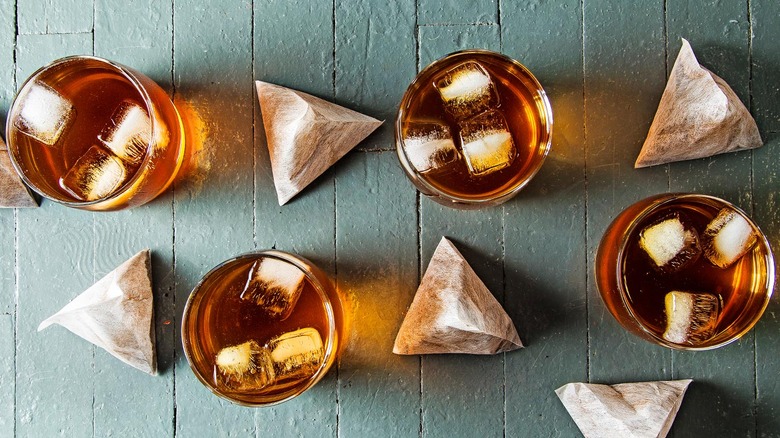What Is Mugicha, And Why You Should Be Drinking It
Mugicha is the kind of thing you crave on a hot day. It's a cooling elixir that gets you through the sweaty sauna Japan becomes in summer, or cools you down after a long afternoon of wandering around Disneyland in bone-dry Anaheim, California, throwing up peace signs with Mickey Mouse.
Mugicha, or roasted barley tea, was the sole request from the two bashful Japanese middle schoolgirls after one such afternoon during their stay with my family back in my high school years (well, that and a last meal at Gold Rush-themed steakhouse Claim Jumper).
Little did Ayaka and Moemi know that their host family had no idea what mugicha was. (Thank you, Google and all the Korean markets in Valencia, California.) Turns out mugicha is a bit of an acquired taste. It's more savory than sweet, like drinking charred bread juice. (Stay with me.) Technically a tisane, it's just unhulled barley, roasted until caramel hued and then steeped in hot water. That time over a fire lends it an almost carbonized tannic quality but with slightly honeyed edges from a bit of caramelization. Despite its humble beginnings and murky, swampy brown look, it quickly became a fridge staple next to the skim milk and pulpy orange juice.
"Every Japanese kid grows up drinking mugicha in summer like water. Always cold," Kuniko Yagi, the former Hinoki & the Bird chef tells me as she prepares for her upcoming L.A. ramen shop.
"In the summertime, as soon as my mom brewed and chilled it, I drank up the whole batch, and she had to make more," Naoko Moore, author of Donabe, remembers. "My sister got upset sometimes, because I drank too much of it in the summertime without leaving enough for her."
RELATED Teas That Won't Put Your Palate to Sleep "
Like Capri Sun pouches to my swimming pool days, so are cold glasses of mugicha to Japanese kids, sometimes sweetened with a little sugar. But the brilliant thing about it on parents' part is the undeniable health benefits squeezed into the drink. Rich in vitamins and antioxidants, low in sugar unlike juice boxes, and attributed to improving blood circulation and possibly preventing cancer, it sure beats soda and still pulls on those nostalgic heartstrings.
"I miss it, because I don't tend to see mugicha often in the U.S., and I have been forgetting the existence of it," Yagi says, punctuating the sentence with a sad-face emoji.
It's not easy to find unhulled barley, but it's pretty easy to find fat packets of mugicha, also known as damaicha in China and boricha in Korea, at any Asian market. This is the kind my family hoarded for our exchange students and drank long after the girls flew back to Japan. But a recent adventure in search of mugicha yielded different results. A crawl up to Midtown on recent rainy day in New York City led me to Ippodo, an offshoot of a nearly 300-year-old Japanese tea company, and its counter with a matcha slushie machine and a small, dark tea pot for making fresh mugicha.
"Mugicha? Ice-ooo?" the woman behind the array of beautifully wrapped, fancy teas confirmed. She warmed the roasted barley in the water-filled pot, swirling it with tight, graceful movements, then poured it hot over fat ice cubes in a plastic cup slapped with a sticker of a slightly creepy but endearing-in-a-Japanese-cartoon-y-way cat drawing. Then I bought a whole bag of the stuff.
This was my first time drinking mugicha in years. Like Yagi, I forgot about it, maybe due to living so far from those lazy days in California and in the hustle of the city. But now I'm back to brewing and stocking up on it in preparation for the hot summer days ahead.
